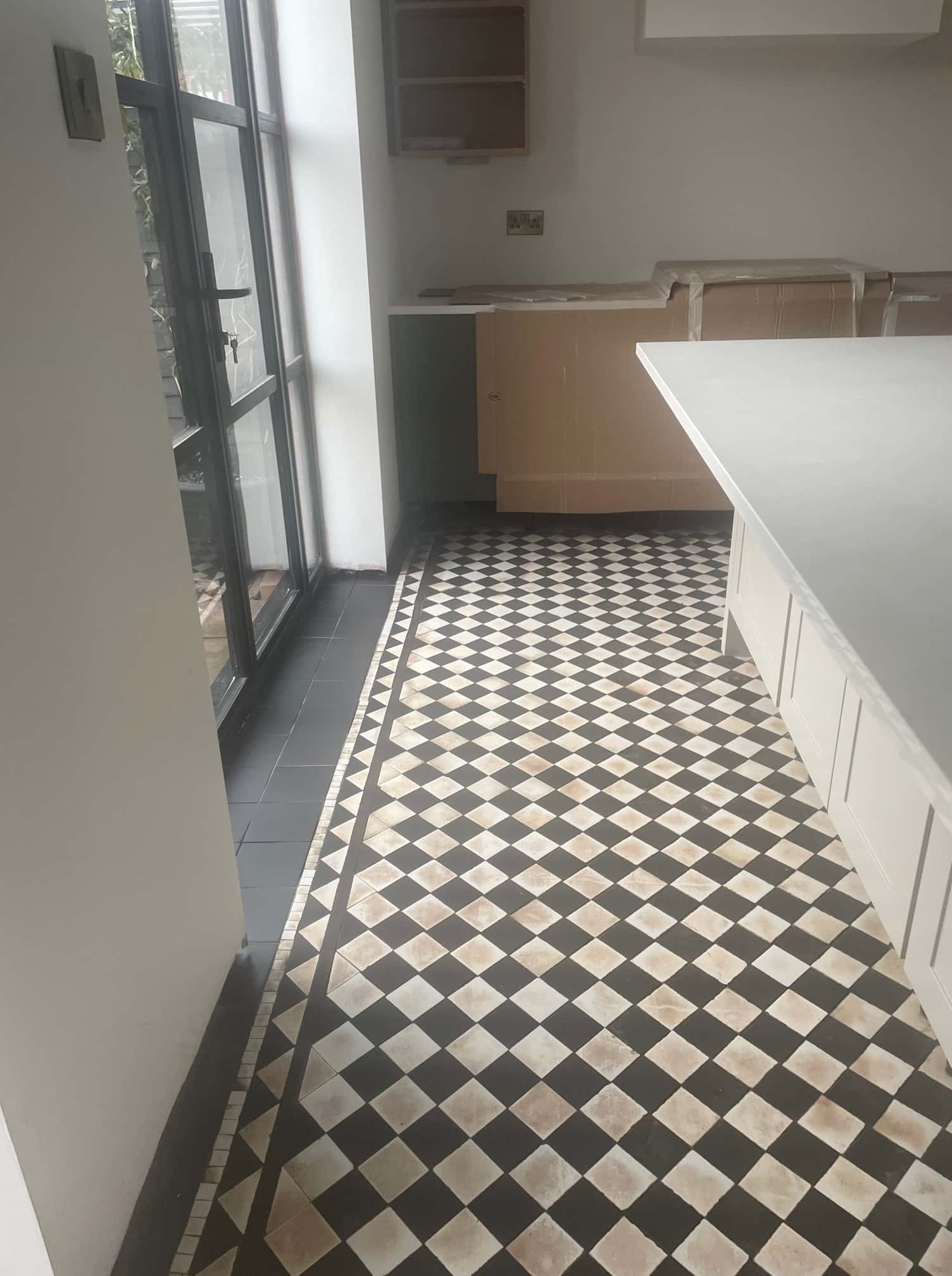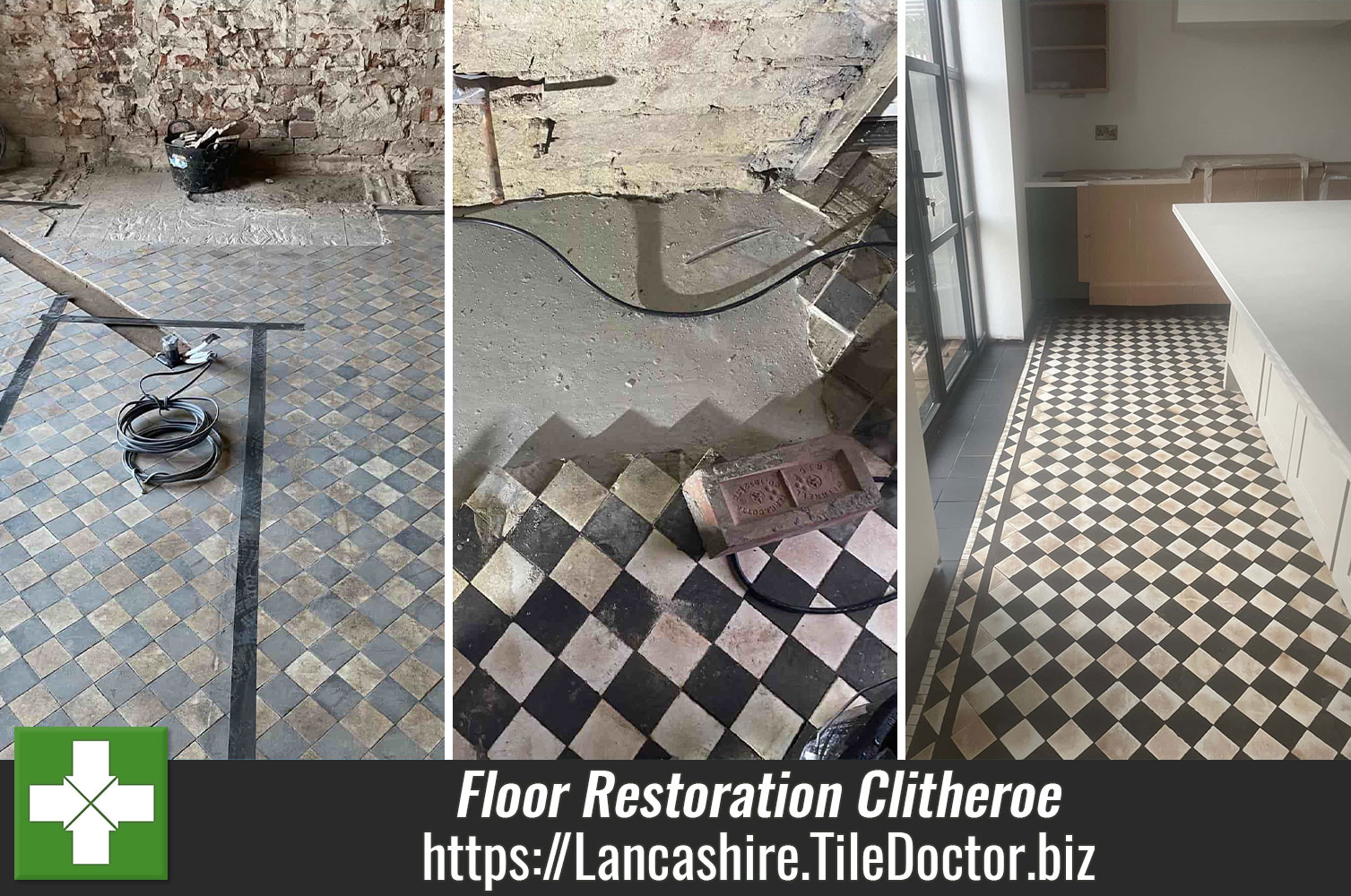Using Tile Doctor Pro-Clean and Diamond Pads to Get Vintage Victorian Tiles Clean in Lancashire
This property in Clitheroe dates to the 1920’s and the current owner wanted to have original Victorian Tiles in the Kitchen restored in time for the installation of new units. You can see form the photographs that the old tiles were in quite a state with 100 years of grime and some parts of the floor were missing large sections of tiling altogether.

It was clearly going to be a big project with lots of tiling required however unphased by the complexity I was happy to do the work and looked forward to seeing it completed with a new kitchen fitted. The work would need to be completed in two parts starting with the reconstruction and initial cleaning of the floor and then returning after the new kitchen units had been fitted to finish the restoration.

Restoring a 1920’s Victorian Floor in Clitheroe Part 1
On our first visit to the property the tiles were given the first of what would be several deep cleans. This involved soaking the tiles in a strong concentration of Tile Doctor Pro-Clean, leaving it to soak in for ten minutes and then working the solution into the floor using a 200-grit diamond encrusted burnishing pad fitted to a rotary buffer machine. The cleaning solution soon turned black with the dirt that was flushed out of the tile, this was then rinsed off and extracted with a wet vacuum.
The initial clean had to be repeated several times to get the tiles in a reasonable condition. Then with the initial clean completed attention was turned to the tiling work which involved relaying large sections of tiles that would be hidden by the new units to the other parts of the floor where there were none. The location of the new units had been marked out with black tape so we were able to identify where we could lift tiles from. Doing it this way rather than using replacements meant that the whole floor would be original and in keeping with the 100-year-old building.

This work took several days and once complete the floor was left covered to protect it whilst the new kitchen was being fitted.
Restoring a 1920’s Victorian Floor in Clitheroe Part 2
On our return a few weeks later, it had become apparent that the design of the kitchen had changed slightly so more tiling work was needed to rectify the problem. Once done the second part of the clean was carried out with a focus on the White tiles which were proving very stubborn to get White again.
The customer wanted it perfect as did we, but I had stated from the outset that with tiles of this age and an unknown history it would be impossible to guarantee the outcome and this is more likely with White and the Sand coloured tiles which are more liable to staining. You will see on the after photos some of the White tiles are more off White in colour which I can assure you this isn’t due to a lack of effort on our part and when it comes to taking on old flooring like this one, there’s only so much cleaning we can do until you realised that this is the best it will get. Fact is you don’t know for sure how well these types of job are going to go until you get stuck in and sometimes even a small pre-test clean can be very misleading and this is what was proven to be the case here.
Sealing a Victorian Tiled Hallway Floor
With the cleaning completed the next step was to apply a sealer to the tiles to protect them from further staining and ingrained dirt. To do this a couple of coats of Tile Doctor Colour Grow were applied. This product is a fully breathable sealer which restores the colour and allows for the floor to breathe, which is an absolutely necesity on an old floor like this one which will not have a damp proof membrane installed.
 |  |
As you can see from the photographs the Kitchen was completely transformed by the time we had finished. The customer was happy with the overall result and the White tiles although not perfect showed a lot of character befitting their age.
 |  |
For aftercare we always advise our customers to use Tile Doctor pH Neutral tile cleaner as it’s specially designed for cleaning sealed surfaces without damaging the sealer which can be the case with stronger bleach-based floor cleaning products you find in supermarkets many of which contain bleach and are simply too strong for use on a sealed floor.
Source: Tile Restoration Products and Services in Lancashire
